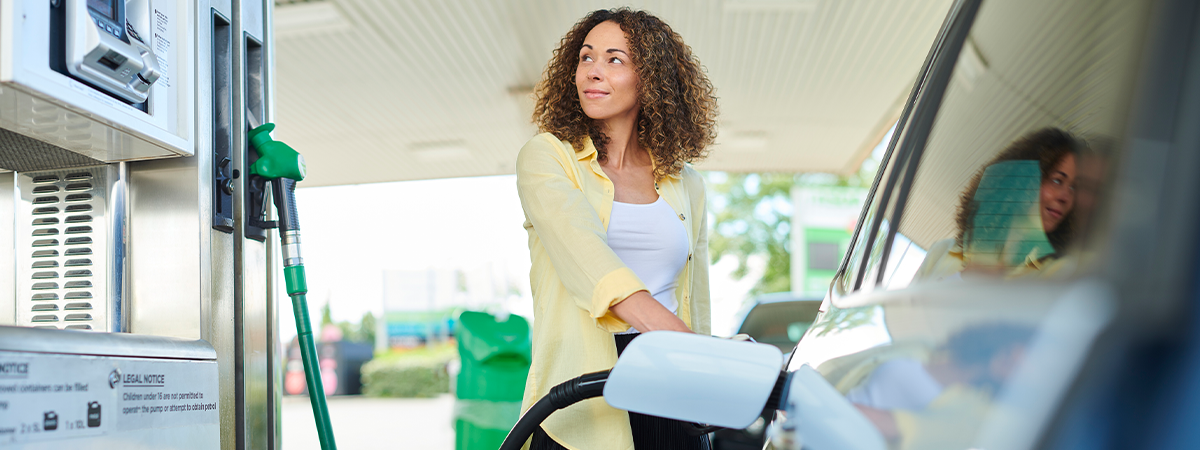
As the cost of fuel continues to rise in Ontario, how can motorists ensure they’re getting the most out of a full tank? The easiest and most effective way to improve the fuel economy of any car is for drivers to modify their driving habits.
Read below to learn our top tips for fuel-efficient driving.
Accelerate gently and coast to decelerate
Rapid acceleration and hard braking can lower fuel economy by 15-30% at highway speeds and 10-40% in stop-and-go traffic.
While driving in the city, you can use less fuel by easing onto the accelerator pedal gently. To be as fuel-efficient as possible, take five seconds to accelerate your vehicle up to 20 km/h from a stop. You can also conserve fuel and save money by taking your foot off the accelerator and coasting to slow down instead of using your brakes.
Watch your speed
Keep to the speed limit and save on fuel. The majority of vehicles are most fuel-efficient when they’re travelling between 40 and 90 km/h.
For example, at 120 km/h, a vehicle uses about 20% more fuel than at 100 km/h. On a 25-km trip, this spike in speed – and fuel consumption – would cut only two minutes from your travel time.
Additionally, when your speed dips and bursts, you use more fuel, and spend more money, than necessary. Tests show that varying your speed between 75 and 85 km/h every 18 seconds can increase your fuel use by 20%. When driving on the highway, consider using cruise control to maintain a steady speed, weather permitting.
Avoid excessive idling
Turn off your engine when you're stopped for more than 60 seconds, except when in traffic. The average vehicle with a 3.5-litre engine consumes more than two litres of fuel per hour when idling. Did you know, letting your engine idle 30 minutes a day for two winter months burns a full tank of gas without ever moving.
Check your tires
Ensure your tires are properly inflated and balanced. Driving a vehicle with under-inflated tires can increase fuel consumption by up to 4%. It can also reduce the life of your tires by more than 10,000 km. Find your vehicle’s optimal tire pressure just inside the driver’s side door.
Practice good car maintenance
Poorly maintained vehicles are less efficient and use more fuel. Here are some car care tips to help you get better fuel economy:
- Keep your vehicle’s fluids properly topped up and get regular oil changes
- Remove unnecessary items from your vehicle. An extra 100 lbs. can reduce fuel economy by up to 1%
- Make sure the engine air filter is clean. A dirty filter can reduce fuel economy on older carbureted cars
- Take off rooftop and bicycle racks when you’re not using them. Items transported on top of the car significantly increase aerodynamic drag, which reduces fuel economy
- Use air conditioning sparingly as it can increase a vehicle’s fuel consumption by as much as 20%
- Regularly track your car's fuel economy. A sudden drop in mileage may indicate a need for car service
Plan ahead and combine errands into one trip
Longer excursions let your vehicle’s engine warm up to its most fuel-efficient temperature. Plan to complete all your errands in one trip, instead of making multiple runs to the store in a week. Your vehicle is more fuel efficient when it is warmed up, so several short trips with a cold engine can use twice as much gas than one longer trip.
Before getting in your vehicle, map out your route to avoid backtracking. Listen to traffic reports and avoid accidents, construction and rush-hour traffic. If you’re able to, avoid roads that cut through busy areas that are dotted with stoplights, intersections and crosswalks.
Find the lowest gas prices
Saving a penny here and there can really add up. Find the gas stations with the best prices by using the CAA Gas Prices tool, which allows drivers to get frequent updates on what the price is at the pump and how it’s trending.
As a CAA Member, you can now save 3¢/L on fuel every time you fill up at participating Shell stations. Swipe your CAA Membership card or load it into the Shell EasyPay™ App once to get savings on every trip. Learn more about this exciting Member Benefit here.
Know your driving costs
Use the CAA Driving Cost Calculator to get a better understanding of the ongoing costs of vehicle ownership. Choose the make, model and annual average kilometres driven and you’ll instantly find out the price, fuel economy and environmental impact— whether it’s a new or used vehicle.
When you follow these tips, you’ll save hundreds of dollars at the pump each year, lengthen the life of your vehicle by preventing unnecessary wear and help to save the environment.
CAA Niagara is there for you when you're in need. From car battery boosts and flat tire service to fuel delivery and lockout services, your CAA Membership has you covered on the road – 24 hours a day, 365 days a year. Download the CAA Mobile App to request roadside assistance quickly and easily. Using the Mobile app allows you to track the status of your call in real-time and allows you to cancel a service request with the simple tap of a button.
 Ontario
Ontario